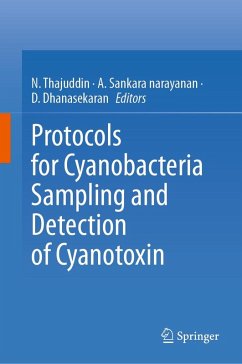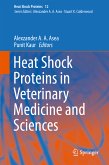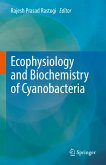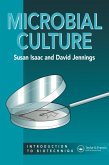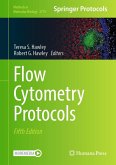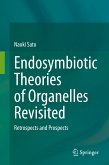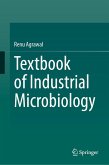Protocols for Cyanobacteria Sampling and Detection of Cyanotoxin (eBook, PDF)
Redaktion: Thajuddin, N.; Dhanasekaran, D.; Sankara Narayanan, A.


Alle Infos zum eBook verschenken

Protocols for Cyanobacteria Sampling and Detection of Cyanotoxin (eBook, PDF)
Redaktion: Thajuddin, N.; Dhanasekaran, D.; Sankara Narayanan, A.
- Format: PDF
- Merkliste
- Auf die Merkliste
- Bewerten Bewerten
- Teilen
- Produkt teilen
- Produkterinnerung
- Produkterinnerung

Hier können Sie sich einloggen

Bitte loggen Sie sich zunächst in Ihr Kundenkonto ein oder registrieren Sie sich bei bücher.de, um das eBook-Abo tolino select nutzen zu können.
This protocol book provides detailed procedures for the isolation of cyanobacteria, extraction, quantification, and detection of cyanotoxins. It illustrates the sampling and processing of toxin-producing cyanobacteria in water and aquatic animal samples, detection of cyanotoxins from Anabaena, Anabaenopsis, Cylindrospermopsis, Microsystis, Microcystis, Nodularia, Nostoc, Schizotrix, Lyngbya, Raphidiopsis, Oscillatoria, Planktothrix in aquatic resources. It also covers toxicity analysis by various bioassay protocols, and in vitro and insilico analysis methods. The book also reviews the methods…mehr
- Geräte: PC
- ohne Kopierschutz
- eBook Hilfe
- Größe: 15.55MB
![Heat Shock Proteins in Veterinary Medicine and Sciences (eBook, PDF) Heat Shock Proteins in Veterinary Medicine and Sciences (eBook, PDF)]() Heat Shock Proteins in Veterinary Medicine and Sciences (eBook, PDF)113,95 €
Heat Shock Proteins in Veterinary Medicine and Sciences (eBook, PDF)113,95 €![Ecophysiology and Biochemistry of Cyanobacteria (eBook, PDF) Ecophysiology and Biochemistry of Cyanobacteria (eBook, PDF)]() Ecophysiology and Biochemistry of Cyanobacteria (eBook, PDF)129,95 €
Ecophysiology and Biochemistry of Cyanobacteria (eBook, PDF)129,95 €![Halotolerance in Cyanobacteria (eBook, PDF) Halotolerance in Cyanobacteria (eBook, PDF)]() Rungaroon Waditee-SirisatthaHalotolerance in Cyanobacteria (eBook, PDF)113,95 €
Rungaroon Waditee-SirisatthaHalotolerance in Cyanobacteria (eBook, PDF)113,95 €![Microbial Culture (eBook, PDF) Microbial Culture (eBook, PDF)]() Susan IsaacMicrobial Culture (eBook, PDF)51,95 €
Susan IsaacMicrobial Culture (eBook, PDF)51,95 €![Flow Cytometry Protocols (eBook, PDF) Flow Cytometry Protocols (eBook, PDF)]() Flow Cytometry Protocols (eBook, PDF)173,95 €
Flow Cytometry Protocols (eBook, PDF)173,95 €![Endosymbiotic Theories of Organelles Revisited (eBook, PDF) Endosymbiotic Theories of Organelles Revisited (eBook, PDF)]() Naoki SatoEndosymbiotic Theories of Organelles Revisited (eBook, PDF)121,95 €
Naoki SatoEndosymbiotic Theories of Organelles Revisited (eBook, PDF)121,95 €![Textbook of Industrial Microbiology (eBook, PDF) Textbook of Industrial Microbiology (eBook, PDF)]() Renu AgrawalTextbook of Industrial Microbiology (eBook, PDF)89,95 €
Renu AgrawalTextbook of Industrial Microbiology (eBook, PDF)89,95 €-
-
-
In a nutshell, the book gives comprehensive procedures about the basics and preliminary processes that are involved in sample collection to advanced methods incorporated into the well-explored and unexplored Cyanobacterial toxin.
Consequently, this manual is useful for both beginners and advanced researchers, including postgraduate students, academicians, researchers, and scientists in the field of Cyanobacterial research.
Dieser Download kann aus rechtlichen Gründen nur mit Rechnungsadresse in A, B, BG, CY, CZ, D, DK, EW, E, FIN, F, GR, HR, H, IRL, I, LT, L, LR, M, NL, PL, P, R, S, SLO, SK ausgeliefert werden.
Hinweis: Dieser Artikel kann nur an eine deutsche Lieferadresse ausgeliefert werden.
- Produktdetails
- Verlag: Springer Nature Singapore
- Seitenzahl: 508
- Erscheinungstermin: 18. Dezember 2023
- Englisch
- ISBN-13: 9789819945146
- Artikelnr.: 69667683
- Verlag: Springer Nature Singapore
- Seitenzahl: 508
- Erscheinungstermin: 18. Dezember 2023
- Englisch
- ISBN-13: 9789819945146
- Artikelnr.: 69667683
- Herstellerkennzeichnung Die Herstellerinformationen sind derzeit nicht verfügbar.
.
.
